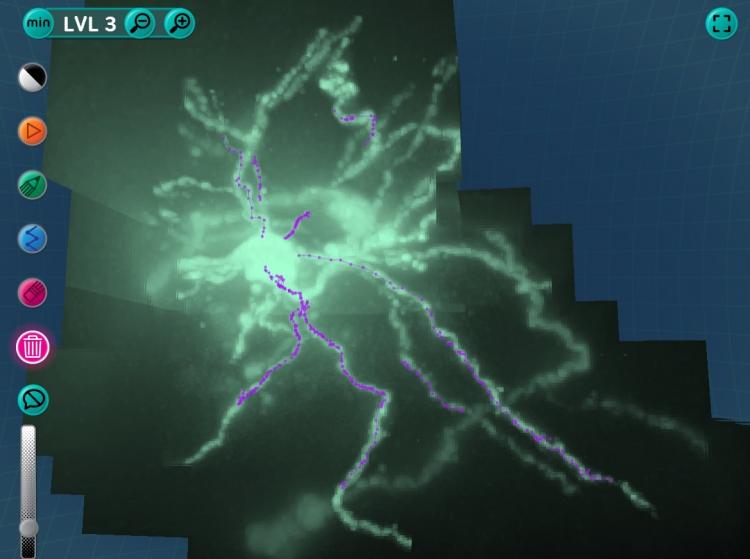
A still from the “Mozak” video game. Players seek to gain points, rise in levels, and track progress on the leader board, as they trace the intricate shapes of neurons. Credit: UW Center for Game Science
Today, the New York Times has a feature story on a citizen science initiative at the UW that enables anyone with a computer and internet connection to contribute to fundamental neuroscience.
More than 200 citizen scientists and gamers each day play the video game Mozak, designed at the Center for Game Science and the Allen Institute for Brain Science, which involves tracing the intricate shapes of brain cells, or neurons, from different regions of the brain in animals and people. The goal is to produce complete, 3-D reconstructions of neurons. Over time, this process will train computers to do the job more accurately than they can now. The resulting catalog of neuron types will ultimately help researchers understand the architecture of brain cells—and the roots of neurodegenerative diseases, such as Alzheimer’s, Parkinson’s, FTD, and ALS, and locate avenues to cell repair. These diseases begin in very specific neuronal populations.

Read the story Video Games Help Model Brain’s Neurons in the New York Times and another perspective in UW Today's Scientific discovery game significantly speeds up neuroscience research process.
Then—Play it yourself! Be part of the effort that has so far helped the Allen Institute increase the number of neuron reconstructions from 2.33 a week, to 8.3 reconstructions a week with the help of video game players.
Mozak builds on “Foldit,” a similar effort of Zoran Popović, Director of the UW Center for Game Science and David Baker, Professor of Biochemistry and a project leader in the UW Alzheimer's Disease Research Center. This video game challenged players to find ways to fold chains of amino acids into new proteins that can bind to sites on misfolded proteins and inhibit them, in order to create vaccines and therapies for diseases such as Ebola or neurodegenerative conditions. It became one of the most successful citizen science projects, attracting nearly a million players over its lifetime. Now, the Baker Lab is testing the stability of Foldit player-designed proteins.
This crowd-sourcing approach to understanding the human brain is supported by the National Science Foundation.




